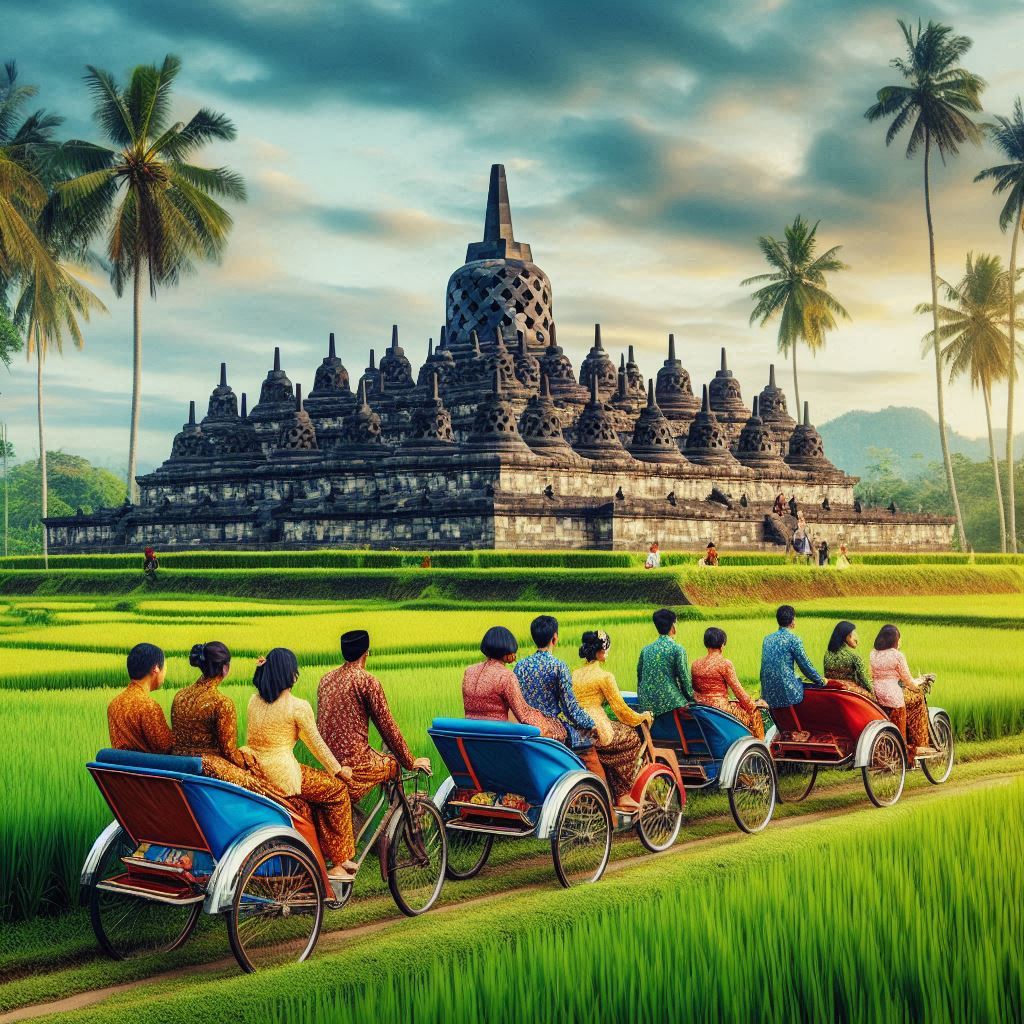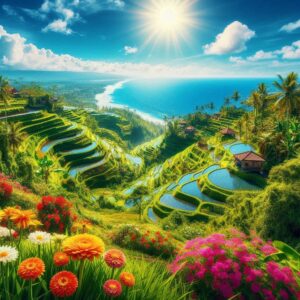Exploring Indonesia
Indonesia, a vast archipelago in Southeast Asia, is a land of breathtaking diversity and mesmerizing beauty. With over 17,000 islands stretching between the Indian and Pacific Oceans, it offers a unique blend of cultures, landscapes, and experiences. From the lush rainforests of Sumatra to the pristine beaches of Bali, Indonesia is a destination that promises adventure, relaxation, and a deep connection with nature and heritage. Whether you’re a seasoned traveler or planning your first international trip, Indonesia has something to offer everyone. This blog post will guide you through the must-visit places, cultural highlights, and practical tips to make your Indonesian journey unforgettable.
Bali: The Island of the Gods
Bali is often the first stop for travelers in Indonesia, and it’s easy to see why. Known for its vibrant culture, stunning beaches, and lush landscapes, Bali offers a little bit of everything.
Ubud: The Cultural Heart
Ubud, located in the heart of Bali, is a haven for art lovers and spiritual seekers. The town is surrounded by terraced rice paddies and dense jungle, offering a serene escape from the more touristy areas. Visit the Ubud Monkey Forest, explore the traditional art market, and don’t miss the chance to see a traditional Balinese dance performance.
Beaches and Surfing
For beach lovers, Bali’s coastline is dotted with stunning beaches. Kuta Beach is famous for its vibrant nightlife and surfing waves, while Nusa Dua offers luxury resorts and tranquil waters. For a more secluded experience, head to the beaches of Uluwatu or the Gili Islands, just a short boat ride away.
Java: The Heartbeat of Indonesia
Java, Indonesia’s most populous island, is home to bustling cities, ancient temples, and active volcanoes. It’s a place where modernity and tradition coexist, offering a rich tapestry of experiences.
Jakarta: The Capital City
Jakarta, the capital of Indonesia, is a sprawling metropolis that never sleeps. The city is a melting pot of cultures, with a diverse culinary scene, shopping malls, and historic sites. Visit the National Monument (Monas), explore the old town of Kota Tua, and indulge in the street food at Glodok, Jakarta’s Chinatown.
Yogyakarta: The Cultural Hub
Yogyakarta, often referred to as Jogja, is the cultural heart of Java. It’s the gateway to the magnificent Borobudur and Prambanan temples, both UNESCO World Heritage Sites. Borobudur, the world’s largest Buddhist temple, and Prambanan, a stunning Hindu temple complex, are must-visit attractions. Yogyakarta itself is known for its traditional arts, including batik, puppet shows, and gamelan music.
Sumatra: The Wild Frontier
Sumatra, the sixth-largest island in the world, is a paradise for nature enthusiasts. It’s home to diverse wildlife, including the endangered Sumatran tiger and orangutan, as well as stunning landscapes.
Lake Toba: A Volcanic Wonder
Lake Toba, the largest volcanic lake in the world, is a sight to behold. Formed by a massive volcanic eruption over 70,000 years ago, the lake is surrounded by lush hills and traditional Batak villages. The island of Samosir, located in the middle of the lake, is a great place to learn about Batak culture and traditions.
Bukit Lawang: Orangutan Sanctuary
Bukit Lawang, located in the Gunung Leuser National Park, is one of the best places to see orangutans in their natural habitat. The rehabilitation center here allows visitors to observe these incredible creatures up close. Trekking through the rainforest, you’ll also encounter other wildlife such as Thomas leaf monkeys, gibbons, and a variety of bird species.
Sulawesi: The Land of Unique Cultures
Sulawesi, with its distinctive shape and diverse cultures, is a fascinating island to explore. It’s known for its traditional houses, vibrant festivals, and unique marine life.
Tana Toraja: Land of the Heavenly Kings
Tana Toraja, located in the highlands of South Sulawesi, is renowned for its unique culture and elaborate funeral rites. The Torajans believe that death is not the end but a journey to the afterlife. Their funerals are elaborate ceremonies that can last for days, featuring traditional music, dancing, and animal sacrifices. The landscape here is dotted with traditional tongkonan houses and cliffside burial sites.
Bunaken National Marine Park: A Diver’s Paradise
For diving enthusiasts, Bunaken National Marine Park offers some of the best underwater experiences in Indonesia. Located off the coast of North Sulawesi, the park is home to a rich diversity of marine life, including over 70 species of coral and numerous fish species. The crystal-clear waters and dramatic underwater landscapes make it a paradise for snorkelers and divers alike.
Flores and Komodo: Islands of Adventure
Flores and Komodo, located in the eastern part of Indonesia, are known for their rugged beauty and adventurous spirit. From climbing volcanoes to meeting Komodo dragons, these islands offer a range of thrilling experiences.
Komodo National Park: Home of the Dragons
Komodo National Park, a UNESCO World Heritage Site, is famous for its Komodo dragons, the largest lizards in the world. These formidable creatures can be seen in their natural habitat on the islands of Komodo and Rinca. The park is also a great spot for diving and snorkeling, with vibrant coral reefs and abundant marine life.
Mount Kelimutu: The Tri-Colored Lakes
Mount Kelimutu, located on the island of Flores, is known for its three colorful crater lakes. Each lake is a different color, which changes over time due to chemical reactions. The sight of these lakes, especially at sunrise, is truly magical and worth the early morning trek.
Practical Tips for Traveling in Indonesia
1. Visa and Entry Requirements: Most nationalities can obtain a visa on arrival for a stay of up to 30 days. It’s always best to check the latest requirements before you travel.
2. Language: Bahasa Indonesia is the official language, but English is widely spoken in tourist areas.
3. Currency: The Indonesian Rupiah (IDR) is the local currency. ATMs are widely available in cities, but it’s a good idea to carry cash when traveling to remote areas.
4. Transportation: Domestic flights are the quickest way to travel between islands. Within cities, taxis, ride-hailing apps, and motorbike rentals are common.
5. Health and Safety: It’s advisable to get travel insurance and check for any required vaccinations. Drink bottled water and take precautions against mosquito bites.
6. Cultural Etiquette: Indonesians are generally friendly and welcoming. Dress modestly, especially when visiting religious sites, and always remove your shoes before entering someone’s home.
Embrace the Diversity of Indonesia
Indonesia’s rich cultural heritage, stunning natural beauty, and warm hospitality make it a destination like no other. Whether you’re exploring ancient temples, diving in pristine waters, trekking through rainforests, or simply relaxing on a beach, Indonesia promises an unforgettable adventure. So pack your bags, embrace the spirit of exploration, and get ready to discover the wonders of Indonesia.






